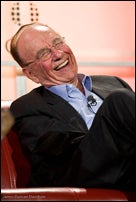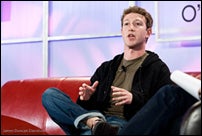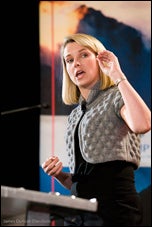SAN FRANCISCO — It was a who’s who in the Internet industry as the Web 2.0 Summit kicked off here Wednesday. An afternoon of high-level presentations culminated with an onstage early-evening Q&A with News Corp. CEO Rupert Murdoch and Chris DeWolfe, co-founder of News Corp. property MySpace.
Murdoch amused the packed hall of Internet execs, developers and entrepreneurs with a few pointed comments and observations. For example he called Facebook “pretty cool” but said it’s more of a utility than MySpace, which he deemed more plugged in to media and culture. MySpace “is not just about looking up friends,” he said.
 |
Murdoch never thought MySpace ‘would do this well.’ Source: James Duncan Davidson |
Asked if he had his eye on other media or Web properties, Murdoch said “everything is too expensive.”
The CEO said he learned the hard way going from publishing newspapers to more expensive magazines and then to Hollywood, that each industry has its own unique culture. “The Internet culture is totally different than anything else,” he said. And Silicon Valley is “the most exciting place on Earth in many ways,” because the pace of technology innovation is so fast and “this is the center of it.”
Many thought Murdoch overpaid for MySpace when he bought it in 2005 for $580 million, but it’s now worth many times that price. “We never imagined it would do this well,” he said. Google struck a three-year $900 million advertising deal with News Corp. last year to provide search and advertising through MySpace.com, IGN and other Fox Interactive Media Web sites owned by the media giant.
There were rumors MySpace would use the event to formally announce plans to open up the social network to developers to a la Facebook. There was no formal detailed announcement, however, and DeWolfe said little beyond confirming plans to open the site to developers in coming months. He added that the site would offer developers a “sandbox” area to test applications.
He went into more detail on advertising initiatives, saying that MySpace is testing a new way for advertisers to “hyper-target” MySpace users based on their profiles. MySpace has identified ten interest areas, which it’s about to expand to 100, and eventually 1,000, that advertisers will be able to pick from. He mentioned “horror movies” and “action sports” as examples of these new groupings.
Facebook founder plays it safe
Facebook CEO and founder Mark Zuckerberg made mostly guarded comments in an onstage interview with Web 2.0 Summit’s program chair John Battelle. Zuckerberg mostly spoke about the social network’s phenomenal growth and challenges going forward. He reiterated comments made at another industry confab in September that Facebook is at an early stage of its development and could take as long as 30 years to reach its full potential.
 |
Zuckerberg remains tight-lipped on Facebook’s future. Source: James Duncan Davidson |
“It might take tens of years to be a really mature platform, but the really quick start we’ve had has been amazing,” he said. Zuckerberg also said there already more than 100,000 people doing Facebook development and the site has 45 million users.
Zuckerberg avoided giving further hints on where Facebook might head in the realm of development, saying only in response to a question, “There might be something in ads. In the next few months we’ll have a lot more on that.”
He did not take the bait offered by Battelle as to whether Facebook is planning an ad network that would extend beyond Facebook like Google’s. Facebook currently has a deal with Microsoft to run its ad network. “The kind of stuff we like to solve are deeply technical problems, like news feeds which computes what is most interesting to share with friends. That’s a really technical, interesting problem.”
Zuckerberg remained coy when asked about rumors Microsoft is trying to buy five percent of the company in a deal that would value Facebook at between $10 and $15 billion. Asked how its funding activities were going, Zuckerberg said: “It’s going well, we’re almost wrapped up.”
Google sees healthy opportunities.
Google Vice President Marissa Mayer gave a presentation focused on the search giant’s plan to offer specialized search services related to health.
“Maybe you’ll be able to carry all your medical information on a USB drive. Or you could travel the globe and know your medical records are just a few keystrokes away” in a personal online account, she said. Such an account might also keep track of your medical history so it would be easy to track when you’re due for flu shots or a checkup.
Mayer gave no timetable as to when the services might be available. In a surprising aside, she mentioned part of the impetus for Google’s interest in this area came from former Intel CEO Andy Grove. Grove contacted Google two years ago as Hurricane Katrina loomed to see if anything could be done to save the tons of paper-based medical records stored in basements that were soon to be flooded.
 |
Mayer on Google and your health Source: James Duncan Davidson |
“It was too late for us to mobilize in time, but it got us thinking that it doesn’t make sense to generate this volume of information on paper when it could be digitized with a lot of control for users,” she said.
She discussed how it should be possible to help hospitals digitize X-Rays and give patients better access to and control of their medical records. She said it’s estimated the 2,000 hospitals in the U.S. generate about seven terabytes of data every year. “We think we can add a lot of value” in helping sort all that out, Mayer said.
Poised for revolution?
A new company run by Internet veterans also presented. RevolutionMoney is part of AOL founder Steve Case’s Revolution network which has been focused on online health care. Revolution Money has audacious plans to upend what it says is the credit card monopoly with a Web 2.0-based model.
He said the $60 billion credit card industry is ripe for a disruptive technology. “The tax by monopolists Visa, MasterCard and American Express keeps going up,” he said. “For every $100 consumer spends on credit card, $3 goes to this tax.”
Revolution Money will charge half a percent for transactions using its card, but wave even that fee for online transactions. “It’s PayPal meets Mastercard without the high fees,” he said. Revolution’s MoneyExchange card will only have the pin number on it, not a person’s name or other personal information which Leonsis said will help cut back on fraud. Also, the card is designed to lighten the load of many wallet holders, combining the features of credit, ATM and prepaid charge cards in one. Users will be able to fund the card and make payments via the Web.
In addition to founder and CEO Jason Hogg, Revolution Money includes some big names on its board of directors include Case, former Treasury Secretary Lawrence Summers, former Charles Schwab chief executive David Pottruck and former Fannie Mae chief executive Franklin Raines. Leonsis said its received $50 million in funding and plans to distribute hundreds of thousands of cards in the next year.


